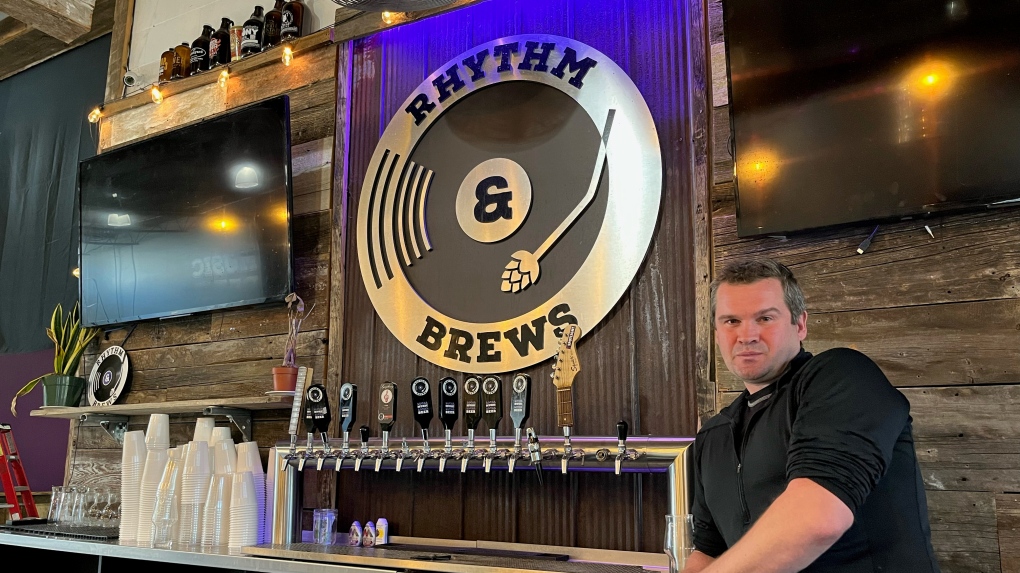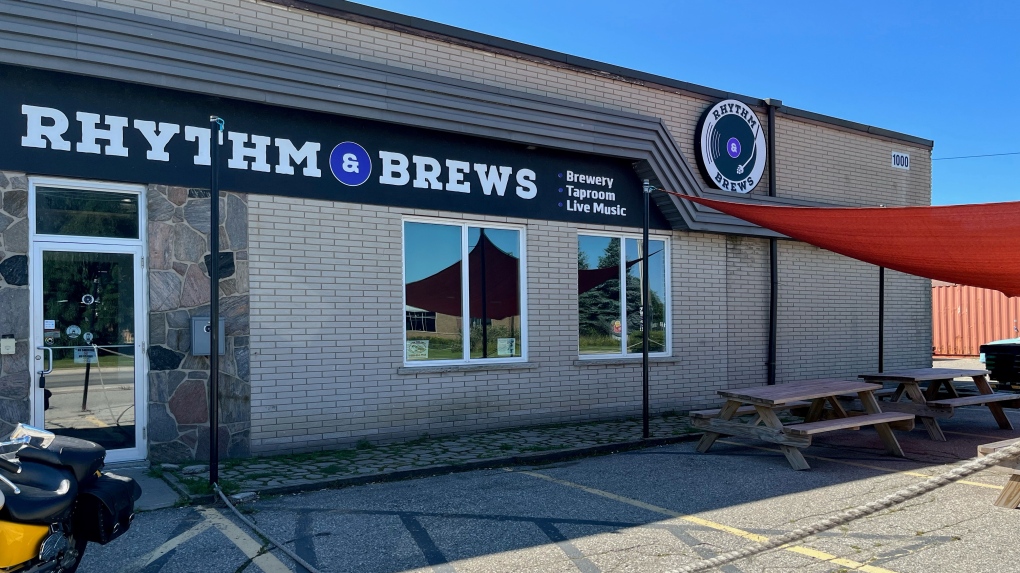Local brewers 'tapped out' amid inflation, changing liquor trends
The craft brewing industry is feeling the effects of inflation, evolving trends and the lingering impact of the pandemic.
Cambridge brewery Rhythm and Brews has closed its doors after five years of business. The owner says all things combined made for the perfect storm that was too much to overcome.
“Things got harder and harder, so we kind of had to pull the plug,” owner Andrew Byer said.
“Last year was great but we remortgaged twice during COVID-19 just to keep the doors open. We did everything we could but we’re tapped out.”
He said it was a difficult decision. Immediately following pandemic lockdowns he said he noticed a bump in business, but throughout all of 2023 it’s been tough.
The cost of operating has made it too much to overcome.
“Beer ingredients have pretty much doubled over the last five years, but you’re not going to double your [price of] your pint of beer. In fact, that crucial ten dollars for a pint – you can’t really go over that,” he explained.
Additionally, Byer said there’s been a dip in alcohol consumption.
“A lot of craft breweries are in a lot of trouble and this is all over the world right now. You’re going to see a lot more close and it breaks my heart,” he said.
“Younger people, in their early 20’s, they’re not drinking as much alcohol in general. Some people say it’s the cannabis shops and I don’t know, it doesn’t matter. It’s their choice and what they want, and it’s not just beer.”
 After five years, Cambridge's Rhythm and Brews is closing. Owner Andrew Byer says a combination of factors made for a perfect storm that was too difficult to overcome. (Stefanie Davis/CTV Kitchener)
After five years, Cambridge's Rhythm and Brews is closing. Owner Andrew Byer says a combination of factors made for a perfect storm that was too difficult to overcome. (Stefanie Davis/CTV Kitchener)
Those who are drinking appear to be reaching more frequently for seltzers, mixed drinks of cocktails.
That’s a trend other breweries, including Kitchener’s Counterpoint Brewing Company, are trying to keep up with as they navigate higher operating costs.
“A few years ago, craft beer was very hot and exciting. It still is, but us, as well as the other breweries, we’re still working on keeping things relevant and going with current beer styles,” Counterpoint Brewing Company owner Graeme Kobayashi said.
“We’re making them a little bit healthier, making them lighter, less alcohol, less calories and that type of thing. We’re introducing fruit and other ingredients to make them a little more exciting or a little more competitive in the market.”
As they’ve been dealing with higher costs of ingredients, shipping, packaging and more, Kobayashi said they’ve had to increase costs and reduce staff.
“People are looking after, obviously, their needs first like groceries, housing and that type of thing. So beer really comes secondary, or third, to all of that,” he explained.
“Different ways to combat that or work through this difficult time are things like working together with other breweries and businesses. We’re looking at doing a couple of fall events with a few other breweries that should be really fun. And then just relying on our customers to stay loyal and to really continue that support local push that we’ve been feeling since day one.”
 The Ontario Craft Brewers Association says more breweries will close without increased government support. (Stefanie Davis/CTV Kitchener)
The Ontario Craft Brewers Association says more breweries will close without increased government support. (Stefanie Davis/CTV Kitchener)
PROVINCIAL LEVEL
Despite some challenges, Ontario Craft Brewers Association president Scott Simmons said there is still a demand for beer across the province.
“It’s kind of a good news, bad news story with the industry. The good news is this is a fairly significant industry in Ontario. It was the fastest growing segment of Ontario manufacturing from 2010 to 2019. There’s now 342 of these small businesses across the province,” Simmons said.
Simmons said he anticipates another growth wave in the industry in the future, but right now, there are many businesses facing struggles.
“The troubling instances that we’re dealing with now are a combination of things,” Simmons explained, saying the pandemic, inflation and a “soft volume year for the industry” made for a difficult 2022.
He said the association hasn’t seen a lot of reported brewery closures yet, but it’s inevitable that more will close if there’s not more government support.
“The cost of aluminum, barley and cardboard have all risen 50 to 150 per cent,” he said.
“How much longer can [breweries] withstand that pressure? A lot of them, for example, have Canada Emergency Business Account loans that are coming due in December, and that’s a lot of money for a small business.”
The association is hoping to see continued customer support, as well as tax relief, going forward.
“Raising the prices of craft beer really isn’t an option in the province right now. Somehow, the costs need to be reduced and taxes are the biggest proponent of that cost,” he explained.
CTVNews.ca Top Stories

Trump threatens to try to take back the Panama Canal. Panama's president balks at the suggestion
Donald Trump suggested Sunday that his new administration could try to regain control of the Panama Canal that the United States “foolishly” ceded to its Central American ally, contending that shippers are charged “ridiculous” fees to pass through the vital transportation channel linking the Atlantic and Pacific Oceans.
Man handed 4th distracted driving charge for using cell phone on Hwy. 417 in Ottawa
An Ottawa driver was charged for using a cell phone behind the wheel on Sunday, the fourth time he has faced distracted driving charges.
Wrongfully convicted N.B. man has mixed feelings since exoneration
Robert Mailman, 76, was exonerated on Jan. 4 of a 1983 murder for which he and his friend Walter Gillespie served lengthy prison terms.
Can the Governor General do what Pierre Poilievre is asking? This expert says no
A historically difficult week for Prime Minister Justin Trudeau and his Liberal government ended with a renewed push from Conservative Leader Pierre Poilievre to topple this government – this time in the form a letter to the Governor General.
opinion Christmas movies for people who don't like Christmas movies
The holidays can bring up a whole gamut of emotions, not just love and goodwill. So CTV film critic Richard Crouse offers up a list of Christmas movies for people who might not enjoy traditional Christmas movies.
More than 7,000 Jeep SUVs recalled in Canada over camera display concern
A software issue potentially affecting the rearview camera display in select Jeep Wagoneer and Grand Cherokee models has prompted a recall of more than 7,000 vehicles.
'I'm still thinking pinch me': lost puppy reunited with family after five years
After almost five years of searching and never giving up hope, the Tuffin family received the best Christmas gift they could have hoped for: being reunited with their long-lost puppy.
10 hospitalized after carbon monoxide poisoning in Ottawa's east end
The Ottawa Police Service says ten people were taken to hospital, with one of them in life-threatening condition, after being exposed to carbon monoxide in the neighbourhood of Vanier on Sunday morning.
New York City police apprehend suspect in the death of a woman found on fire in a subway car
New York City police announced Sunday they have in custody a “person of interest” in the early morning death of a woman who they believe may have fallen asleep on a stationary subway train before being intentionally lit on fire by a man she didn't know.


































